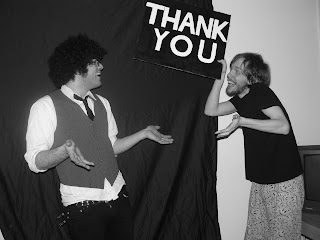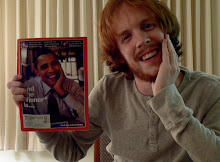What, exactly, is White Culture in America?
The recent laughs provided by
Things White People Like had me running over this question in my head. Don't get me wrong, I have my own definition (it mostly consists of a deep analysis of Murphy Brown and Everybody Loves Raymond), but I began to ponder what White America itself had to say on the subject.
So, I went to
Wikipedia.
I decided that a direct search would work best, so I searched 'white culture', and was redirected. Considering the very subculture that Wikipedia is produced and used by (ie college students and young people with regular access to a computer with internet), the brevity of the wiki on
White American Culture is quite amusing. I was naturally dissapointed, but it still provided a smile.
My favorite part? This:
"In the United States, the term "suburban culture" is considered a euphemism for White American culture and is sometimes used as a racially neutral alternative."I can just imagine someone euphemistically referring to how the housing prices are spiking thanks to this insidious "suburban" influence. Oh wait. I guess they already do that.
Searching a little further, I discovered that the
White American wiki is somewhat more developed. According to the entry, a White American is any American "having origins in any of the original peoples of Europe, the Middle East, or North Africa". The wiki points out that this definition (the same one used by the US Census) puts half of the Hispanic population of the U.S. into this category. So, naturally, this definition leaves a tremendous amount to be desired.
The article continues by introducing two other definitions: one social, the other based strictly on societal influence.
Wiki's social definition, as supported by quotes from Karen Brodkin & David R. Roediger, posits that "whiteness" is a European concept stemming from a need to distance slave-owners from their non-white slaves, to unite Europe in the face of the "discovery" of "non-white" continents such as Asia and Africa (for example, former non-whites: the irish, the italians, the greeks, ashkenazi jews, germans, etc), and to legally divide those of European descent from those of African or Asian descent (ie, these laws did not divide based on race, they created race). This section is still too technical however, to truly explain what a White American is today. It does, however, point out the people who take great pains to make sure that everyone knows they are not a White American (ie. everyone we've [Britain, America, Europe, etc] ever oppressed or tried to colonize).
The last definition Wiki provides is based on inherited societal position, and it may hit closest to the definition I have in my head. By this definition, a White American is anyone who benefits from white privilege. In some ways, I suppose that is what race has become in America: a division based on your societal and cultural capital. This section also contains my hand-down favorite scholarly paraphrase about White America ever. I'll just post the whole definition and highlight my favorite part:
As whites are the dominant racial and cultural group; according to sociologist Steven Seidman writing about the most prominent perspective among researches, "White culture constitutes the general cultural mainstream, causing non-White culture to be seen as deviant, in either a positive or negative manner. Moreover, Whites tend to be disproportionately represented in powerful positions, controlling almost all political, economic and cultural institutions." Yet, according to Seidman, Whites are most commonly unaware of their "privilege" and the manner in which their culture has always been dominant in the US, as they do not identify as members of a specific racial group but rather incorrectly perceive their views and culture as "raceless," when in fact it is ethno-national (ethnic / cultural) specific with a racial base component.
This quote is pretty much the bluntest way to say "you're white if you inherit white privilage, you're especially white if you don't know what 'white privilage' is".
This article temporarily sated my thirst for truth. Afterall, it had provided me with three somewhat accurate definitions and even something about how clueless white people are to the existence of the White American identity. But even with these great elements, my favorite part of the article is the selection of the six definitive white Americans in the photo area:
 Madeleine Albright
Madeleine Albright - I guess to emphasize just how directly White Americans are linked to Europe; she was born in Prague afterall. Also, she is a powerful white woman in America, which rarer than a powerful white man...but infinitely more common than a powerful non-white woman in America (minus Oprah, of course...I'm sorry Mrs. Winfrey, it'll never happen again).
.jpg) Marilyn Monroe
Marilyn Monroe - I completely agree with this, she deserves the title "Definitive White American", one of the top White Culture Icons for sure. Blonde, busty, fatally self-destructive, willing to take her clothes off, and publically vapid...she had it all.
 Abraham Lincoln
Abraham Lincoln - The "see, we're not all completely clueless racists" selection. Lincoln: not definitive...or maybe he is. Perhaps Lincoln represents white people's acceptance of progress in the face of absolutely no other choice. He is also known as The Patron Saint of White Guilt, and The Best Neo-Liberal President the 19th Century-era Republican Party Ever Produced.
 Jose Romualdo Pacheco Jr.
Jose Romualdo Pacheco Jr. - I had to look this guy up [ie click on his name], but he was a California-born American politician of Mexican descent [see, when he was born, California WAS Mexico...goes to show you how stupid national origin as racial definition is, don't it?] who was the first [and, so far, only] Hispanic governor of California. Wow. I understand that he's meant to show the true range of "whiteness" in America as described by the first (and technically third) definition, but what an obscure choice. Tokenism, anyone?
 John F. Kennedy Jr.
John F. Kennedy Jr. - Along with Marilyn, JFK's persona and mythology embody the values, ideals, and attitudes of Baby Boomer/Post Greatest Generation White America better than almost any one else I can think of. In the 1960's (a tranformative decade for White American culture) JFK was busy facing the future, changing the world, publically loving the blacks, tolerating and gently exploiting the hispanics, and dreaming of an America that greatly resembles the all-white European Court of King Arthur; all achieved with only a politically-connected father, the Chicago mafia, millions of dollars, and incredible good looks to fall back on. JFK: every liberal, white man over the age of 45's hero.
 Raquel Welch -
Raquel Welch - Born Jo Raquel Tejada , Raquel Welch was an iconic actress/pinup (slightly under the giants like Monroe and Rita Hayworth) who worked during (and defined) the 1960's in America. She brings two things to this list: Firstly, proof that White American actresses of Hispanic descent have always been accepted in Hollywood...as long as they pretended that they were in no way an American actress of Hispanic descent (a lesson Jessica Alba has updated into "talk constantly about how you're not
really one of those scary Hispanics"). Secondly, Raquel earned her place on this list twice over: she appears in the iconic 1994 White Culture classic Shawshank Redemption on a poster used by Tim Robbins to cover his escape tunnel.
Well. There you go. If Wikipedia is the internet's dictionary, then these six are the internet's selection of White America defined.
What would my list look like? Kind of you to ask. Here are my
Top 6 Definitive White Americans of All Time (in no order):
Albert Einstein
John D. Rockefeller
James Dean
Eleanor Roosevelt
Leona Helmsley
Judy Garland
I would provide explanations, but I am tired of thinking about this. God bless us all, white and non-white by all definitions.
Nathaniel Tyson








.jpg)








